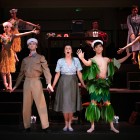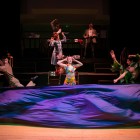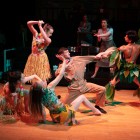Dido and Aeneas 2019Royal Conservatoire of Scotland
Read more about the opera Dido and Aeneas
In recent years the Conservatoire has developed a useful stream of programming with two oe three short operas teamed in groupings that give students a wide range of musical and dramatic styles. Sometimes these work remarkably well. In Glasgow they are usually mounted in the excellent Alexander Gibson Opera Studio - nowadays fitted with a permanent gantry of seating for the audience that allows space for a good-sized area for the performers.
This run opened with one of the great classics of early baroque opera. Purcell's Dido and Aeneas is a largely familiar tale of love betrayed, derived from Virgil's Aeneid. In classical literature the gods frequently toy with the affections of mortals. Purcell's librettist, Nahum Tate, adds a gloss to this by introducing a sorceress and attendant witches (after all, the late eighteenth century was a time when supposed witches were still being incinerated on a regular basis in Scotland). Her rather unmotivated antipathy to Dido can be accepted at face value.
In her contemporary interpretation this time, director Maxine Braham introduced a modern gloss based around the idea of a TV chat show, in which the unhappy couple are forced apart by the machinations of a jealous 'ex' and a studio audience being egged on to an extent where Dido is apparently led to commit suicide live on air. While the idea that these generally repellant TV programmes, with their moronic and hysterical studio audiences, could be bent to this purpose, was in some ways an attractive one, it remained a problem that the particular opera selected did not seem entirely ideal, being musically altogether too controlled and restrained to fit the interpretation imposed on it.
Never mind, there were few instances when it got in the way. Three dancers shimmied around the stage occasionally. A cameraman wandered discreetly. Belinda, as chat-show host helpfully picked up Dido's empty pill bottle at the end for a camera close-up. It was all worked through with a remarkable degree of consistency, but it was hard to get excited about it.
Musically the whole enterprise was quite first-class. At the back, centre-stage, there was a lovely little band of ten string players plus harpsichord, ideally paced under the direction of Anthony Kraus. The eighteen choristers sat most of the time on a raked gantry to the left of centre, and projected their important musical sequences movingly with great clarity. The principals were left with plenty of space for their acting.
The solo singing was fine, if in a generally modern style rather than baroque. Most of the voices were quite powerful and there was only a little of the expected vocal ornamentation. Nonetheless this was a very enjoyable performance of one of the most deservedly famed of seventeenth century operas. Carolyn Holt and Catrin Woodruff launched things confidently and there were no vocal weaknesses and plenty of character projection from the rest of the cast.
Dido was performed in a double bill with a mid 20th century rarity in Bernstein's Trouble in Tahiti. Composed in 1952, it also illustrates a relationship in difficulties. Whether that in itself was enough to make it an ideal follow-up for the Purcell was an interesting challenge that came off quite well.
Performance Cast
- Dido Queen of Carthage
- Belinda a lady in waiting
- Second Lady
- Aeneas a Trojan prince
- Sorceress
- First Witch
- Second Witch
- Spirit in the form of Mercury
- Sailor


